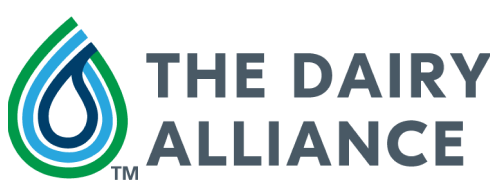
Meet and Learn About Our Magnificent Dairy Cows
Dairy farming focuses on raising dairy cows for the production of milk and other dairy products.
The care of cows is an important part of successful dairy farming.
Healthy Cows are Happy Dairy Cows
Ensuring the cows’ well-being and comfort is crucial for a sustainable and ethical dairy farming industry. This includes supporting hard-working dairy farmers so they have the right tools and information to properly care for these large beautiful mammals who give so much to us and our health.
Dairy farmers take excellent care of their cows. They provide dairy cattle with clean and comfortable housing, fresh water, food, and medical attention when necessary. Dairy farmers know that healthy, happy cows produce milk of a higher quality, so the animals’ well-being is a farmer’s top priority.
Dairy farmers across the Southeast implement best practices that promote the health and happiness of dairy cows. This includes providing them with a clean and comfortable environment, access to fresh water and nutritious feed, and proper healthcare.
We promote sustainable and ethical dairy farming practices, such as minimizing the environmental impact of dairy operations and ensuring responsible resource management.
By supporting dairy farmers who prioritize animal welfare, we strive to provide consumers with dairy products that are not only nutritious but also produced with respect for the welfare of dairy cows.
Feeding & Drinking Dairy Cattle
Proper nutrition is paramount to maintaining the health and productivity of dairy cows. It ensures that cows receive the necessary nutrients to support their overall health and milk production.
You may not have known that dairy cattle can eat up to 100 pounds of food per day. Dairy cows require carbohydrates, proteins, fats, vitamins, minerals, and water to meet their metabolic needs and produce high-quality milk. Their nutritional requirements vary at different stages of lactation, and the diet should be adjusted accordingly.
Some dairy farmers allow their cows to graze on grass or provide them with hay. Many farmers also choose to supplement their cows’ diets with mixed ration feeds including corn, soybeans, sorghum, and other grains to provide additional nutrients and fiber. Many farmers employ a nutritionist who formulates feed rations and a specific diet for milk cows. The diet is based on their age, weight, if they’re milking or dry, or if they have any other health considerations.
Effective feeding strategies can play a role in improving milk quality. For instance, certain feed additives can help maintain a healthy rumen pH, crucial for optimal digestion and nutrient absorption. High-quality forages in the diet can enhance the fatty acid profile of milk, resulting in improved milk fat content.
Perhaps not one of the well-known cow facts, but cows can drink as much as 50 gallons of water each day. This makes it important for cows to have a clean and accessible water supply.
Dairy Cattle Comfort & Housing
Cows require a lot of time to rest and digest their food. Therefore, dairy farmers provide cows with a variety of bedding options. Cow fact: they spend up to 12 hours lying down daily. Some of the products used include sawdust shavings, sand, shredded recycled tire rubber, dried manure that’s been pressed and sanitized, and some barns even have waterbed-style mattresses.
The beds and walkways are scraped for manure and flushed with water several times a day. Some dairy farms have systems that can sift and separate the water, manure, sand, or other bedding so that the products can be cleaned and recycled for later use.
Keeping cows cool, especially in the summertime, is important in keeping milk production up. Many farmers equip their cow barns with fans and sprinklers or mister systems. Tunnel barns are long buildings that have fans at each end to pull air through the barn and out the other end to keep temperatures cool.
A free-stall barn provides cool shade during the summer and protection from the rain and elements. Cows can walk around the barn for exercise, get something to eat or drink, and then lie down in a bed whenever they want. Barns can also be outfitted with large, automated brushes. This allows the cows to walk up and activate the rotating bristles to scratch their heads or bodies whenever they want.
Medical Care for Dairy Cows
The health of a milking cow and the quality of milk it produces heavily depend on how the cow is treated and managed. This involves best practices, comprehensive healthcare, nutrition optimization, and milk production efficiency.
· Creating a clean and comfortable environment for dairy cows is essential. This includes proper ventilation, temperature control, and adequate bedding to reduce stress levels.
· Regular health check-ups by a qualified veterinarian are vital to monitor the health of milking cows and prevent diseases. Vaccinations, deworming, and hoof care form an integral part of the healthcare program.
· A balanced diet tailored to the specific needs of dairy cattle at different stages of lactation ensures optimal milk production. Good milking practices and equipment maintenance ensure milk quality and disease prevention.
In essence, effective management is a comprehensive approach aimed at maintaining healthy dairy cows and maximizing healthy milk productivity.
Dairy farmers work closely with their veterinarians who perform regular herd checks to make sure the cows are healthy. Depending on the herd size, a vet may visit monthly, weekly, or even daily.
Dairy Cows are Happy Cows
There are different breeds of dairy cattle in The United States, and they are all taken care of at the highest standards. Holstein, Jersey, Brown Swiss, and Milking Shorthorns are common dairy breeds. Here at The Dairy Alliance, the health and welfare of our cows is our top priority.
Watch our Cow Videos
Cow Feeding
Modern Barns
Cow Comfort
Dairy Medicine






